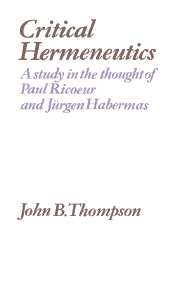Book contents
6 - Problems in the theory of reference and truth
Published online by Cambridge University Press: 10 December 2009
Summary
The problems of reference and truth form a common focal point in the traditions of ordinary language philosophy, hermeneutic phenomenology and critical social theory. Wittgenstein, Strawson and others explicate the referential relation by means of the applicability of identifying descriptions and criticise the conception of truth which posits a correspondence between language and the world. The recent work of Ricoeur proffers the intriguing idea of split reference, coupling this idea with a notion of truth which terminates the dialectic of interpretation. One of Habermas's most original proposals is the formulation of a consensus theory of truth, which specifies the conditions for the rational redemption of truth claims in terms of the necessary presuppositions of speech. In the present chapter, I conclude my critical discussion of the three traditions by undertaking an assessment of these contributions. Among other things I attempt to show, first, that the link between reference and description is less secure than ordinary language philosophers suggest, and that these philosophers fail to furnish a theory of truth; second, that Ricoeur's remarks on the problems of reference and truth are incomplete, often relying upon authors whose views are at variance with his own; and third, that Habermas's argument for the necessary presupposition of an ideal speech situation is problematic, so that his conjunction of rational consensus and truth must be held in doubt.
- Type
- Chapter
- Information
- Critical HermeneuticsA Study in the Thought of Paul Ricoeur and Jürgen Habermas, pp. 182 - 213Publisher: Cambridge University PressPrint publication year: 1981



